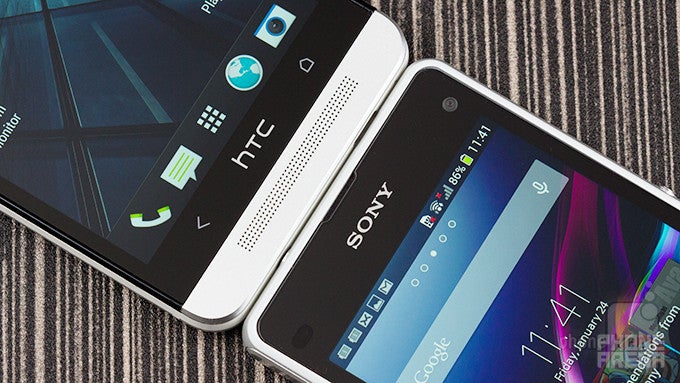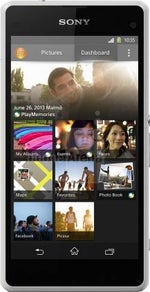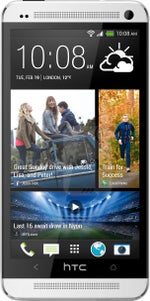Sony Xperia Z1 Compact vs HTC One

Introduction
Sony's miniaturized version of its flagship Xperia Z1 – the Xperia Z1 Compact – arrived at the smartphone arena to an expectedly enthusiastic fanfare. It ventures into previously uncharted land, as while competitors from HTC and Samsung have already come out with their respective 'mini' editions of their high-ends, neither quite did it with the bang with which Sony has. The Z1 Compact, said simply, puts pretty much every other 'mini' to shame, as its specs sheet reads literally the same as the one attached to its bigger brother. Moreover, Sony has donned the Z1 Compact with the same premium-looking, water- and dust-proof body.
Design
The Z1 Compact is distinguished by its 'OmniBalance' design language, and looks a lot like the rest of the Sony Xperia family of devices. But that's not a bad thing necessarily. The phone sports a front side made of glass, and a back side made of plastic, with a metal frame hugging its profile, all of which set it apart from the sea of Android phones. The premium effect is slightly diminished, as both the left and right side of the device are littered with port flaps and the power, volume, and shutter keys. Those are all well-built, however, and provide satisfying feedback. On the back, you're treated to a markedly different view – the glass is only occupied by the camera and LED flash units, along with the Sony and Xperia logos, giving it a much cleaner look.
Display
Sony's stubbornness has finally receded, and the company has fitted an IPS LCD panel in the Z1 Compact. The fairly dense, 720x1280 pixel screen (342ppi) has an accurate color temperature of about 7250K, with brightness peaking at the excellent 515 nits.
Overall, colors are reproduced correctly by both displays, though Sony's screen is slightly more true to the actual, target colors. On the other hand, the One's display is considerably sharper, and also disproportionally bigger, as it houses the software navigation buttons on its bezel, unlike the Z1 Compact. When it comes down to calling this, we thought that the One is the slightly better option, as we felt that the added benefits of a larger, crisper display largely make up for the miniscule superiority of the Z1 Compact's panel in terms of color fidelity.
Interface and functionality
Both Sony and HTC have gone down the path of customizing the user experience on their respective takes on Google's Android. Both devices are based on Android 4.3 Jelly Bean, but the Xperia UI on the Z1 Compact is perhaps a bit more functional, whereas HTC's sleeker Sense 5.5 skin is just a tad more bare.
Taking a look at the Z1 Compact, it feels more familiar, especially if you've come across a stock Android experience before, as the skin follows into the footsteps of Google's idea of what the flow of its OS should be like. Things like the homescreen are easily adjustable and there really is no lack of themes and personalization options with Sony's firmware. Next to it, the HTC One looks flat and conservative in its expression, but that also gives it a more restrained, respectable look. It feels like an UI fit for adults, with features like BlinkFeed providing you with an easy way to stay in touch. But there's a learning curve to getting the most of either handset, and one can hardly contest that.
Both devices make use of a large, properly spaced-out keyboard, though typing on the Z1 Compact obviously requires more of an effort, even though the layout is more spaced out in comparison.
Processor and memory
Simply putting the innards of the Sony Xperia Z1 Compact and the HTC One side-by-side leaves little to decipher – the former is the more potent device of the two. This is to be expected, as the newer Z1 Compact is outfitted with Qualcomm's best – the quad-core, 2.2GHz Snapdragon 800, whereas HTC's aging flagship is 'only' powered by a quad-core, 1.7GHz Snapdragon 600. In addition, it sure helps that the Z1 Compact's silicon has to push considerably less pixels on the screen, whereas the One's inferior processor has to carry the full weight of an 1080p display.
The One is also a notch behind the Z1 Compact when it comes to memory. Unlike the One's 2GB of LPDDR2 RAM, Sony's phone is equipped with faster 2GB of dual-channel, LPDDR3 RAM. Moreover, the Z1 Compact enjoys the luxury that a microSD card slot is these days, whereas the One is stuck with what it has built-in.
Internet and connectivity
An extension of its more capable processor, the browsing experience on the Z1 Compact is a notch above what you get with the One. Surfing the web on both device is a breeze, as they both have Chrome built-in, though with the HTC One, its in-house Android browser is the default option. Regardless of which one you stick with, both are about as equally functional and perform pretty much on par, and yet the Z1 Compact's Snapdragon 800 chip obviously renders pages a tad faster. But not much faster.
Camera
Both the Z1 Compact and the HTC One pack some interesting camera tech and features, but before we get into comparing stills, lets cover the specs of the two shooters. The Z1 Compact packs the same impressive, 20.7-megapixel, 1/2.3'' Exmor RS sensor as the Xperia Z1, along with a wide, f/2.0 aperture. The HTC One makes a less impressive showing, as its 4-megapixel, f/2.0 aperture 'UltraPixel' camera lags behind units on rival flagships. The UltraPixel moniker serves to distinguish the fact that the Taiwanese company has fitted extra-large, 2.0-micron pixels (vs 1.17-micron for the Z1 Compact), which should capture more light as to help with low-light shots. HTC, however, is also using a much smaller, 1/3'' sensor, which provides less of a total surface area dedicated to capturing light. As for software functionality, we're treated to a fairly clean interface with both phones. You have access to manual controls, like white balance and ISO levels, and you can also snap HDR photos and video, panoramas, and even fluid, 60FPS clips with the One.
But how do these two perform in the real world when put side-by-side? Well, for starters, the Z1 Compact allows you to snap photos slightly faster than the HTC One – in our testing, it took the 20.7-megapixel snapper exactly 3 seconds to power on, take a picture, commit it to its memory, and prepare for another. This same routine took the HTC One 3.4 seconds. Synthetic benchmarks (CamSpeed), on the other hand, give the edge to the Taiwanese flagship, though we tend to attach a heavier weight to real world performance.
As for the quality of snaps, the Z1 Compact obviously produces considerably more detailed, but softer stills during the day. That said, do keep in mind that in Superior Auto mode, the Z1 Compact software usually snaps 8-megapixel shots, which are then enhanced using 'pixel binning' technology, which essentially combines information from multiple pixels in order to arrive at a generally clearer and less noisy pictures. Next to those, the UltraPixel camera on the One manages some rather sharp shots, but detail is quickly lost once you start zooming in. The two cameras set their respective level of exposure accurately for the most part, though the HTC One is perhaps a slightly more prone to misjudgments. The One also tends to exaggerate colors a bit, ending up with warmer, eye-catching, but ultimately inaccurate snaps, whereas the Z1 Compact is uncompromisingly distant from such tricks.
Looking at video capture, the two shooters are more on par, at least during the day. Both units capture a pleasant amount of detail, though the HTC One produces some palpably darker footage. On the other hand, and especially at night, the Z1 Compact produces more noise in comparison, and it's still a notch colder than the more-inviting, warm colors of the HTC One. Unfortunately, however, video capture in darkness is a bit tragic in the case of the latter, as the frame rate drops to some seriously choppy levels.
Multimedia
Both phones have more than a capable chip to render and encode different kinds of videos at 1080p without a sweat, but there's more to a proper multimedia device than just that. We dare say that the HTC One smokes the Z1 Compact in this particular department, as its got the advantage of bigger, more-detailed screen, but also far more potent audio capabilities. The front-facing Boom Sound stereo speakers offer some truly immersive sound, and they're also noticeably louder than the mono speaker on the Z1 Compact. The same hold true when talking about the headphones that go with either smartphone – the earphones on the HTC One are just more potent.
Call quality
Call quality is another area where the HTC One shines. Thanks to the top Boom Sound speaker, which doubles up as an earpiece, sound is loud and rich. Voices are transmitted pleasantly across the network, and callers' voices are not distorted. Moreover, the other side hears you quite well, as the microphone setup on the One picks even nuances in your voice and renders them properly. Next to it, the Z1 Compact sounds less impressive. But its speaker and microphone only suffer a defeat at the hands of a device that has some serious chops in this regard, as they're very much up to standard, and do not disappoint.
Battery
Both the Xperia Z1 Compact and the HTC One have to make do with an embedded, 2300mAh cell. The less-demanding screen and more efficient processor on the Z1 Compact give it a leg up over the HTC One, though both are far from the most enduring devices out there. Sony, for its part, rates the battery of the Z1 Compact as good for 18 hours of talk time and 25 days of standby, both while connected to a 3G network. These figures are slightly lower in the case of the One, at 18 hours of talk time and 20.8 days of standby.
Conclusion
No conclusive winner can be cast when you pit the Z1 Compact with the HTC One, as they're two devices that specialize in somewhat different areas, though each is more than capable in pretty much every and all regards.
The Xperia Z1 Compact, as the name suggests, is a great pick if you're tired of lugging around a big device, but you still don't want to compromise on the specs front. Moreover, its fancy shooter will certainly not leave you wanting. The HTC One's performance capabilities are lagging behind in terms of raw power, but that isn't saying a whole lot, seeing as the Snapdragon 800 is already so far ahead of the curve. It's speedy, and its camera, while lagging behind what rival flagships have to offer, is still adequate.. Little can stand in its way when it comes to its audio capabilities, too, and it makes for a great overall multimedia device that leaves very little to desire. The One is also, arguably, the more attractive device of the two, and that's saying something, as the Z1 Compact is a looker in its own right.
In the end, we wish we could say that it comes down to a simple choice between practicality and looks, but that's just not the case. Both these devices are heavily invested in both these fields, though the Z1 Compact is definitely the more pragmatic of the two, while the HTC One sports the better looks and bigger, more detailed screen.

Follow us on Google News





























Things that are NOT allowed:
To help keep our community safe and free from spam, we apply temporary limits to newly created accounts: